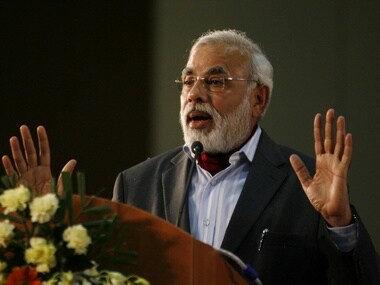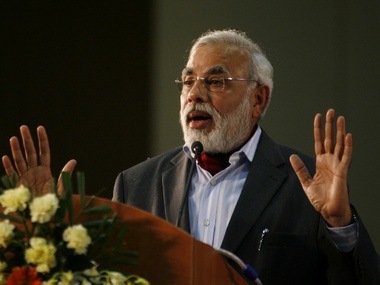The 15th meeting of the National Integration Council (NIC) on Saturday, chaired by the Prime Minister, in normal circumstances could have very well passed off as a regular event. But it didn’t. The reason: The buzz in official circles is the controversial Communal Bill that the Centre is planning to introduce in the Winter Session of Parliament has left some of the state CMs sulking, which is why they preferred to stay away. [caption id=“attachment_80944” align=“alignleft” width=“380” caption=“Modi and the UPA are not on the same page over Gujarat governor’s recent notification to independently appoint a Lokayukta for the state. Reuters”]
 [/caption] The notable absentees at the meet are Gujarat chief minister Narendra Modi and five others, including Bihar chief minister Nitish Kumar, West Bengal CM Mamata Banerjee, Kerala’s Oommen Chandy, Tamil Nadu’s Jayalalithaa and Uttar Pradesh chief minister Mayawati. The Bharatiya Janata Party (BJP) has taken the line that the Bill is divisive and non-secular, and is biased against the Hindus. “We have opposed the Communal Violence Bill which was on the agenda because instead of controlling communal tension, it will only fuel communal violence… This Bill pre-judges that the majority will be the oppressor and the minority will be the victim,” said top BJP leader Sushma Swaraj. It may just not be all about the fractious Bill per se. According to TV sources, Modi and the UPA are not exactly on the same page over Gujarat governor Kamla Beniwal’s recent notification to independently appoint a Lokayukta for the state. The CM is reportedly upset with the Centre for its refusal to take back the circular. The Lokayukta row, which is getting nastier by the day, has even the BJP all worked up and put it in direct confrontation with the Congress. The BJP’s grouse is that the governor should have kept the chief minister in the loop before going ahead with the official announcement and has even termed the move “unconstitutional”. The matter came to a head when the saffron party stalled Parliament this week over the governor’s decision. Chief Minister Nitish Kumar’s case is mostly on the familiar lines. He is all for a more extensive debate on the Communal Bill. But apparently, the Center stuck to its own script and has not obliged. The most notable absentee of all was Mamata Banerjee, given the fact that she was part of the coalition until recently and her warm vibes with the Centre. But PM’s Dhaka trip may have played a spoilsport here. The Trinamool Congress is ranged against the legislation since the CM is still reported to be smarting under the government’s position on the Teesta even though resolution of the international boundary issue is being touted as a big achievement by the UPA-II. By staying away, Mamata may have made her displeasure known and sent out a strong signal. UPA’s bonhomie with Tamil Nadu is now a thing of the past, particularly after Karunanidhi’s exit following the Assembly elections. Chief minister Jayalalithaa is a tough customer to deal with. And it’s no secret that Jayalalithaa does not see eye to eye with the Centre over some of the policies pursued vis-a-vis her state. The rehabilitation of Sri Lankan Tamils is another sticking point. And finally, no prizes for guessing why Uttar Pradesh chief minister Mayawati did not turn up. A vocal critic of the government, she is known for her below-the-belt punches and loses no opportunity to get even with the central dispensation. The recent leaks by the whistle-blowing website WikiLeaks have not helped things either. The CM thinks there is a bigger plot at work. Whatever the reasons to give the NIC meet a miss, one thing is unmistakably clear. The Centre-state equations are not what it used to be and are in a state of deep chill. And it would require more than just statesmanship from either side to get back to those good old days.
[/caption] The notable absentees at the meet are Gujarat chief minister Narendra Modi and five others, including Bihar chief minister Nitish Kumar, West Bengal CM Mamata Banerjee, Kerala’s Oommen Chandy, Tamil Nadu’s Jayalalithaa and Uttar Pradesh chief minister Mayawati. The Bharatiya Janata Party (BJP) has taken the line that the Bill is divisive and non-secular, and is biased against the Hindus. “We have opposed the Communal Violence Bill which was on the agenda because instead of controlling communal tension, it will only fuel communal violence… This Bill pre-judges that the majority will be the oppressor and the minority will be the victim,” said top BJP leader Sushma Swaraj. It may just not be all about the fractious Bill per se. According to TV sources, Modi and the UPA are not exactly on the same page over Gujarat governor Kamla Beniwal’s recent notification to independently appoint a Lokayukta for the state. The CM is reportedly upset with the Centre for its refusal to take back the circular. The Lokayukta row, which is getting nastier by the day, has even the BJP all worked up and put it in direct confrontation with the Congress. The BJP’s grouse is that the governor should have kept the chief minister in the loop before going ahead with the official announcement and has even termed the move “unconstitutional”. The matter came to a head when the saffron party stalled Parliament this week over the governor’s decision. Chief Minister Nitish Kumar’s case is mostly on the familiar lines. He is all for a more extensive debate on the Communal Bill. But apparently, the Center stuck to its own script and has not obliged. The most notable absentee of all was Mamata Banerjee, given the fact that she was part of the coalition until recently and her warm vibes with the Centre. But PM’s Dhaka trip may have played a spoilsport here. The Trinamool Congress is ranged against the legislation since the CM is still reported to be smarting under the government’s position on the Teesta even though resolution of the international boundary issue is being touted as a big achievement by the UPA-II. By staying away, Mamata may have made her displeasure known and sent out a strong signal. UPA’s bonhomie with Tamil Nadu is now a thing of the past, particularly after Karunanidhi’s exit following the Assembly elections. Chief minister Jayalalithaa is a tough customer to deal with. And it’s no secret that Jayalalithaa does not see eye to eye with the Centre over some of the policies pursued vis-a-vis her state. The rehabilitation of Sri Lankan Tamils is another sticking point. And finally, no prizes for guessing why Uttar Pradesh chief minister Mayawati did not turn up. A vocal critic of the government, she is known for her below-the-belt punches and loses no opportunity to get even with the central dispensation. The recent leaks by the whistle-blowing website WikiLeaks have not helped things either. The CM thinks there is a bigger plot at work. Whatever the reasons to give the NIC meet a miss, one thing is unmistakably clear. The Centre-state equations are not what it used to be and are in a state of deep chill. And it would require more than just statesmanship from either side to get back to those good old days.
It's a divided house: Mamata, Modi fail to integrate
Aurobindo Das
• September 12, 2011, 17:12:57 IST
The buzz in official circles is the controversial Communal Bill that the Centre is planning to introduce in the Winter Session of Parliament has left some state CMs sulking, which is why they chose to stay away.
Advertisement
)
End of Article